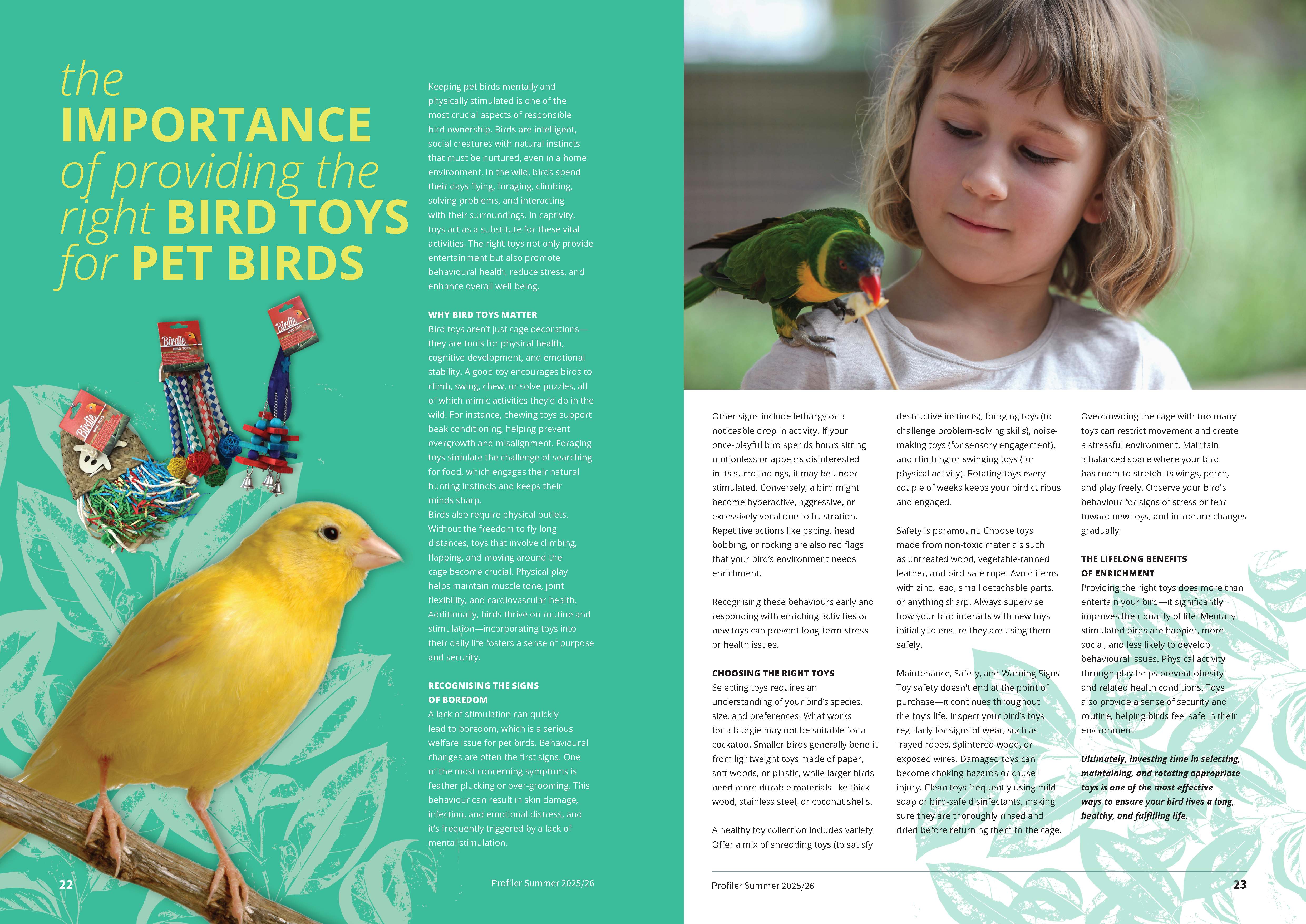The Importance Of Providing The Right Bird Toys For Pet Birds
Posted by Aquarium Spare Parts on 3rd Nov 2025
Keeping pet birds mentally and physically stimulated is one of the most crucial aspects of responsible bird ownership. Birds are intelligent, social creatures with natural instincts that must be nurtured, even in a home environment. In the wild, birds spend their days flying, foraging, climbing, solving problems, and interacting with their surroundings. In captivity, toys act as a substitute for these vital activities. The right toys not only provide entertainment but also promote behavioural health, reduce stress, and enhance overall well-being.
WHY BIRD TOYS MATTER
Bird toys aren’t just cage decorations—they are tools for physical health, cognitive development, and emotional stability. A good toy encourages birds to climb, swing, chew, or solve puzzles, all of which mimic activities they'd do in the wild. For instance, chewing toys support beak conditioning, helping prevent overgrowth and misalignment. Foraging toys simulate the challenge of searching for food, which engages their natural hunting instincts and keeps their minds sharp. Birds also require physical outlets. Without the freedom to fly long distances, toys that involve climbing, flapping, and moving around the cage become crucial. Physical play helps maintain muscle tone, joint flexibility, and cardiovascular health. Additionally, birds thrive on routine and stimulation—incorporating toys into their daily life fosters a sense of purpose and security.
RECOGNISING THE SIGNS OF BOREDOM
A lack of stimulation can quickly lead to boredom, which is a serious welfare issue for pet birds. Behavioural changes are often the first signs. One of the most concerning symptoms is feather plucking or over-grooming. This behaviour can result in skin damage, infection, and emotional distress, and it’s frequently triggered by a lack of mental stimulation.
Other signs include lethargy or a noticeable drop in activity. If your once-playful bird spends hours sitting motionless or appears disinterested in its surroundings, it may be under stimulated. Conversely, a bird might become hyperactive, aggressive, or excessively vocal due to frustration. Repetitive actions like pacing, head bobbing, or rocking are also red flags that your bird’s environment needs enrichment.
Recognising these behaviours early and responding with enriching activities or new toys can prevent long-term stress or health issues.
CHOOSING THE RIGHT TOYS
Selecting toys requires an understanding of your bird’s species, size, and preferences. What works for a budgie may not be suitable for a cockatoo. Smaller birds generally benefit from lightweight toys made of paper, soft woods, or plastic, while larger birds need more durable materials like thick wood, stainless steel, or coconut shells. A healthy toy collection includes variety. Offer a mix of shredding toys (to satisfy destructive instincts), foraging toys (to challenge problem-solving skills), noise-making toys (for sensory engagement), and climbing or swinging toys (for physical activity). Rotating toys every couple of weeks keeps your bird curious and engaged.
Safety is paramount. Choose toys made from non-toxic materials such as untreated wood, vegetable-tanned leather, and bird-safe rope. Avoid items with zinc, lead, small detachable parts, or anything sharp. Always supervise how your bird interacts with new toys initially to ensure they are using them safely.
Maintenance, Safety, and Warning Signs Toy safety doesn't end at the point of purchase—it continues throughout the toy’s life. Inspect your bird’s toys regularly for signs of wear, such as frayed ropes, splintered wood, or exposed wires. Damaged toys can become choking hazards or cause injury. Clean toys frequently using mild soap or bird-safe disinfectants, making sure they are thoroughly rinsed and dried before returning them to the cage.
Overcrowding the cage with too many toys can restrict movement and create a stressful environment. Maintain a balanced space where your bird has room to stretch its wings, perch, and play freely. Observe your bird's behaviour for signs of stress or fear toward new toys, and introduce changes gradually.
THE LIFELONG BENEFITS OF ENRICHMENT
Providing the right toys does more than entertain your bird—it significantly improves their quality of life. Mentally stimulated birds are happier, more social, and less likely to develop behavioural issues. Physical activity through play helps prevent obesity and related health conditions. Toys also provide a sense of security and routine, helping birds feel safe in their environment. Ultimately, investing time in selecting, maintaining, and rotating appropriate toys is one of the most effective ways to ensure your bird lives a long, healthy, and fulfilling life.



